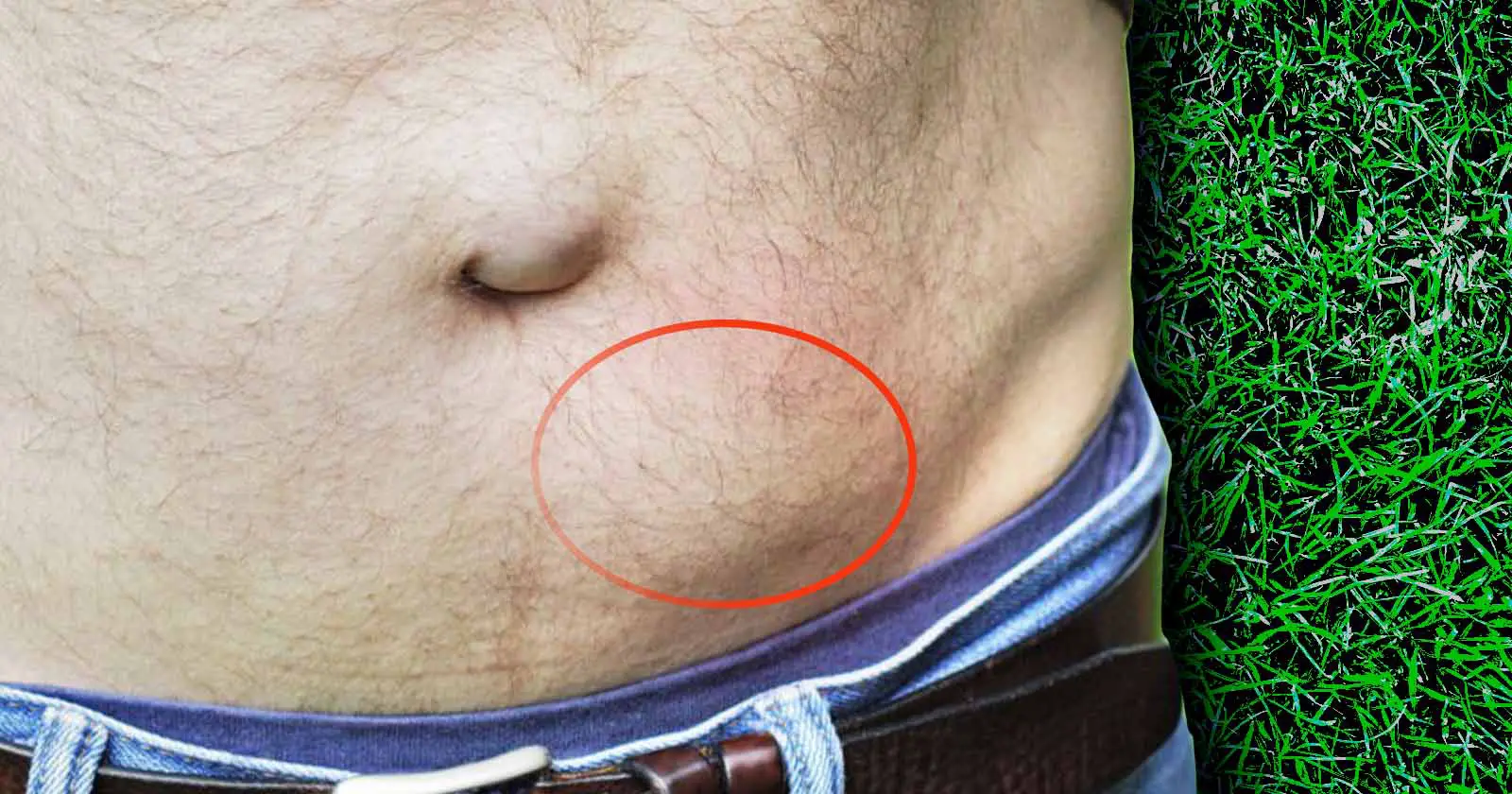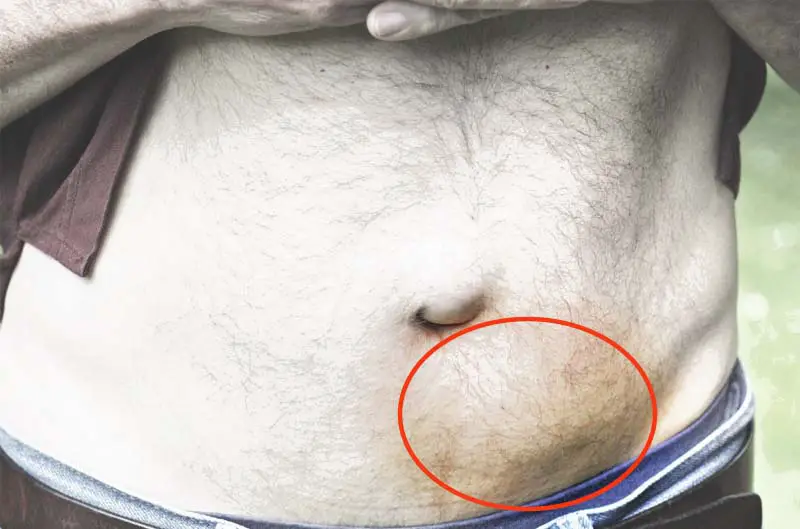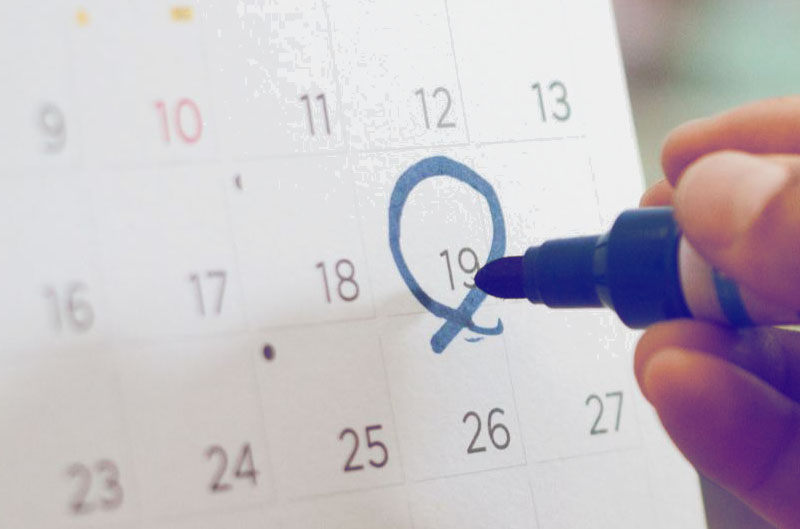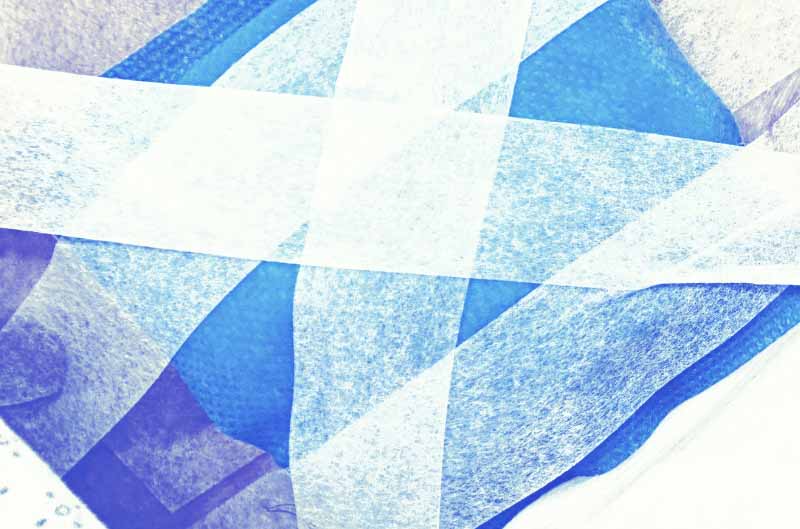Golf is hard enough as it is.
Especially if you’re experiencing any type of hernia pain while trying to use your entire body to swing a golf club.
Some hernia cases are different than others, and if you’re worried about possibly making it worse by playing golf with a hernia then definitely check out some important time tables and treatment methods we have below…

A hernia is not an injury that anyone would relish dealing with. Hernias are enormously painful, mostly caused by human tissue or an organ bulging through an opening in the abdominal lining.
While hernias are common among men and women, the symptoms vary. Hernia injuries are commonly found in golfers, leaving many questioning if they can play through the pain.
Can I play golf with a hernia?
As a rule, you can play golf with a hernia. However, it depends on the severity of your hernia injury. Doctors recommend not playing golf for the shortest recovery time of six to eight weeks. By allowing the hernia to completely heal, you lower the likelihood of it worsening or reoccurring.
While hernias are not considered serious injuries, it is important to fully recover before attempting to do any rigorous exercise again, as it may become more severe. Golfers often get hernias as they frequently strain their abdominal muscles while playing.
However, some hernias are relatively minor, meaning you can continue playing golf, while others require surgery.
Should I play golf with a hernia?
If you pick up a hernia injury while playing golf, doctors usually recommend six to eight weeks of rest and recovery before you return to the golf course again.
However, the general recovery rule does not apply to all golfers or people, as hernia injuries vary drastically. Some people are not even aware that they have obtained a hernia injury despite feeling mild pain in their abdominal muscles.
It is common for golfers to occasionally strain their abdominals due to the game’s physical nature.
Since hernias usually occur in the lower abdominal region, golfers experience intense muscular discomfort that prevents them from playing for between six and eight weeks.
A hernia injury is an unfortunate and often terrifying experience for most people, especially casual golfers.
However, it should be noted that some hernias are mild and can go completely unnoticed for months before becoming a more significant issue.
Mild hernias can be fixed by pressing the bulge in your abdomen back into place, although the safest option is to get it thoroughly inspected by a trained doctor.
If the pain in your abdominal muscles is more severe than a typical side strain, you likely have a hernia injury. Occasionally, the bulging hernia can be pushed back into the abdominal opening if the pain is not noticeably acute.
However, if the hernia is causing you constant discomfort, you should immediately stop playing as it will likely require surgery.

Furthermore, the best practice to follow is to avoid certain harsh, jerky, or sudden movements while playing golf to avoid aggravating the hernia.
While you can play golf with a mild hernia, experts recommend checking in with your trusted doctor before the injury becomes severe, potentially stopping you from swinging your golf clubs permanently.
What are the signs of a hernia injury?
Due to the varying severity of hernia injuries, they cannot be easy to identify immediately. Usually, the first sign is when an unusual bulge develops in the region of your lower abdominal muscles.
If you have identified an unusual bulge in your abdominals, you have likely experienced some form of hernia injury.
After the bulge has been spotted, you should softly try and press it back into the abdominal lining. If the pain is acute during this process, the hernia likely requires professional medical attention, and you should stop playing your round of golf without delay.
Frequently, your hernia injury will go completely unnoticed while you are playing golf. However, when you attempt to go to the bathroom later that night, you might feel discomfort while passing a regular bowel movement.
Suppose you feel any unusual discomfort while sitting on the toilet. In that case, it is no reason to be alarmed or embarrassed as hernias are one of the most common injuries in America.
Hernia injuries are more commonly found among men than women and, in certain cases, can be identified by excruciating pain in your abdominals while standing, sitting, or any other regular daily activity.
It should be noted that hernia injuries cannot heal by themselves and will require medical assistance or surgery in severe cases.
Due to modern medicine and technology, hernias are rarely life-threatening; however, it will mean that your golf game must immediately be placed on hold. Hernia surgery in the 21st century is uncomplicated and non-invasive, and patients can usually leave the hospital the same day.

While doctors recommend surgery, rest, and recovery for most hernia injuries, some are so mild that you can continue with your daily life and golf game without medical attention.
If your hernia injury does not impact your golf swing, athletic capabilities, or general well-being, you can continue playing golf without rest, recovery, or medical interventions.
Will playing golf aggravate my hernia injury?
Hernia injuries are commonly aggravated by fast, intense, or powerful movements. Since golf is not thought of as a high-intensity sport, the chances of you worsening your hernia injury are slim.
However, if you take your golf seriously and exert an enormous amount of physical energy into each swing, it may aggravate your hernia injury.
Due to the risks involved with playing golf while carrying a hernia injury, it is recommended that you rest for between six to eight weeks before returning to the course with light practice rounds.
After two weeks of low-intensity practice, you can start returning to your normal routine while continuously checking for any unusual pain originating from your lower abdominal area.
How long should you wait to play golf after hernia surgery?
The time you must wait to resume vigorous exercise, such as golf, after picking up a hernia exclusively depends on the severity of your initial injury.
If your hernia injury is not severe, it is recommended that you start playing golf again after three weeks. While you can play golf with your usual intensity before three weeks, you will likely aggravate your injury to the point that surgery is your only remaining option.
Golfers that are unfortunate enough to get troublesome hernia injuries mostly require surgical intervention. Modern hernia surgery is efficient, safe, and normally completed within a day.
In rare cases, patients require a general anesthetic to complete the hernia operation, which will rule them out of playing gold for at least six weeks.
Hernia surgeries are performed through a technique known as keyhole surgery, which is non-invasive and does not necessitate a long recovery.
In addition, keyhole hernia surgery contains far less patient risk and mandatory rehabilitation time. This option benefits golfers aiming to get back onto the course in as short a time as possible.
If you require surgery for your hernia, it is likely that you will experience general discomfort and pain throughout your body, especially in the abdomen area, for 24 to 48 hours after being discharged.
Usually, patients will be in excruciating pain for the first hour following the procedure, after which it gradually subsides.
By the fifth day following the procedure, most of the pain should have dwindled, and the rehabilitation process will be initiated. Modern rehabilitation procedures allow for patients to be fully functional after two weeks.
Doctors usually recommend light exercise such as walking or swimming following the two weeks, allowing your body to slowly readjust to intense exercise.

Depending on the severity of your hernia injury, you can safely start playing golf again after three weeks. However, your golf should exclusively involve low-intensity practices since your body will not be accustomed to the rigors you previously placed on it.
Despite being permitted to play golf after only three weeks of rehabilitation, doctors note that continuing your therapy sessions for between six and eight weeks is safer.
While two months may feel like an eternity to not play golf, it is safer for your body, hernia injury, and long-term recovery to follow the medical professional’s advice closely.
The best treatment for golf hernia injuries
Over the last few decades, medical professionals have refined the rehabilitation program for hernia injuries to the point where there is little room for future improvement.
Modern hernia treatment processes usually follow a three-step process.
- The first step is the most important and will include a wide range of strengthening exercises that aim to improve general stability, core strength, and injury prevention.
- The second step in the rehabilitation process involves all forms of stretching and yoga. By increasing the muscle’s ability to stretch beyond their usual limits, you are enhancing their ability to prevent injuries such as hernias.
- Stretching and yoga are essential to rehabilitation as they have been proven to prevent impact injuries, usually when a person overextends their muscles or tendons.
- The last step of the rehabilitation process entails mobility movements. Mobility movements encompass the first two steps as building blocks, utilizing them for functional movements. Throughout the three-step recovery process, you should be able to regain critical balance and core strength.
Constant stretching will dramatically enhance your body’s form and flexibility, while the prescribed mobility movements will promote vital muscular strength.
Muscular and bodily mobility is more important than most people realize as they lose inhibited or tight muscles while allowing them to engage in future hernia injury prevention.
How will it feel to play golf after hernia surgery?
Returning to golf will feel slightly unusual after hernia surgery. Most people claim that they fear swinging the club with the intensity they were previously accustomed to.
Playing your first round of golf may feel like a daunting activity depending on the severity and the extent of the hernia injury.
Despite going through an intensive rehabilitation process and completing the required rest time of between six and eight weeks, most golfers take a while to regain their confidence and get back into their groove.
Furthermore, many golfers are forced to adjust their swing to avoid further hernia injuries. Hernias can occur on the left or right side of a person’s abdominal area.

If your hernia injury happened on the right side of your body, your swing would have to be drastically adjusted to avoid unnecessary twisting in your weakened torso area.
If you listened to professional medical advice and completed your prescribed rest and rehabilitation program, you should not face any unforeseen challenges when returning to the golf course.
While fear and doubt may linger in your mind regarding a reoccurrence of your unfortunate hernia injury, the likelihood of it happening again is extremely slim.
After returning to the golf course following a two-month layoff period, you should refrain from doing high-impact or high-intensity workouts.
Despite your hernia being fully healed, experiencing frequent high impacts will increase the chances of the injury reoccurring or worsening as the wire mesh placed inside your abdominal opening may cause inflammation.
One of the risks involved with a hernia operation is the wire mesh and its associated inflammation characteristics.
Human bodies are not designed to accept foreign objects permanently installed in sensitive areas such as the abdominal cavity.
While the risk of intimation and chronic disease are low, high-impact exercise, golf swings, or workouts drastically increase the likelihood.
Now, to wrap things up
A hernia injury is a horrific experience for most people, especially golfers. Since hernias usually occur in the lower abdominal region, golfers experience intense muscular discomfort that prevents them from playing shortly.
While some hernias are mild and can be fixed by pushing the bulge in your abdomen back into place, most require immediate surgery and rehabilitation.
Modern hernia surgery is a straightforward process. However, the rehabilitation process is extensive and requires constant commitment if you aim to avoid any similar injuries occurring on the golf course.
Doctors recommend avoiding the golf course or any other strenuous exercise for between six and eight weeks, although you can start light practicing routines after three weeks.
Follow us on Twitter at https://twitter.com/wolfitgolf and let me know if you begin to start playing golf pain-free.
References